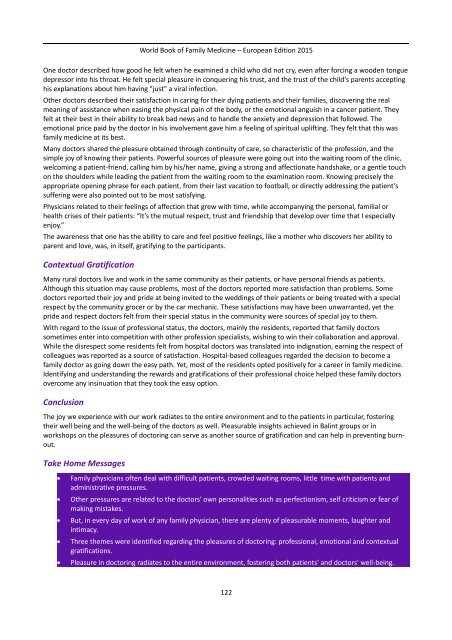Family Medicine
World Book 2015
World Book 2015
Create successful ePaper yourself
Turn your PDF publications into a flip-book with our unique Google optimized e-Paper software.
World Book of <strong>Family</strong> <strong>Medicine</strong> – European Edition 2015<br />
One doctor described how good he felt when he examined a child who did not cry, even after forcing a wooden tongue<br />
depressor into his throat. He felt special pleasure in conquering his trust, and the trust of the child's parents accepting<br />
his explanations about him having "just" a viral infection.<br />
Other doctors described their satisfaction in caring for their dying patients and their families, discovering the real<br />
meaning of assistance when easing the physical pain of the body, or the emotional anguish in a cancer patient. They<br />
felt at their best in their ability to break bad news and to handle the anxiety and depression that followed. The<br />
emotional price paid by the doctor in his involvement gave him a feeling of spiritual uplifting. They felt that this was<br />
family medicine at its best.<br />
Many doctors shared the pleasure obtained through continuity of care, so characteristic of the profession, and the<br />
simple joy of knowing their patients. Powerful sources of pleasure were going out into the waiting room of the clinic,<br />
welcoming a patient-friend, calling him by his/her name, giving a strong and affectionate handshake, or a gentle touch<br />
on the shoulders while leading the patient from the waiting room to the examination room. Knowing precisely the<br />
appropriate opening phrase for each patient, from their last vacation to football, or directly addressing the patient’s<br />
suffering were also pointed out to be most satisfying.<br />
Physicians related to their feelings of affection that grew with time, while accompanying the personal, familial or<br />
health crises of their patients: “It’s the mutual respect, trust and friendship that develop over time that I especially<br />
enjoy.”<br />
The awareness that one has the ability to care and feel positive feelings, like a mother who discovers her ability to<br />
parent and love, was, in itself, gratifying to the participants.<br />
Contextual Gratification<br />
Many rural doctors live and work in the same community as their patients, or have personal friends as patients.<br />
Although this situation may cause problems, most of the doctors reported more satisfaction than problems. Some<br />
doctors reported their joy and pride at being invited to the weddings of their patients or being treated with a special<br />
respect by the community grocer or by the car mechanic. These satisfactions may have been unwarranted, yet the<br />
pride and respect doctors felt from their special status in the community were sources of special joy to them.<br />
With regard to the issue of professional status, the doctors, mainly the residents, reported that family doctors<br />
sometimes enter into competition with other profession specialists, wishing to win their collaboration and approval.<br />
While the disrespect some residents felt from hospital doctors was translated into indignation, earning the respect of<br />
colleagues was reported as a source of satisfaction. Hospital-based colleagues regarded the decision to become a<br />
family doctor as going down the easy path. Yet, most of the residents opted positively for a career in family medicine.<br />
Identifying and understanding the rewards and gratifications of their professional choice helped these family doctors<br />
overcome any insinuation that they took the easy option.<br />
Conclusion<br />
The joy we experience with our work radiates to the entire environment and to the patients in particular, fostering<br />
their well being and the well-being of the doctors as well. Pleasurable insights achieved in Balint groups or in<br />
workshops on the pleasures of doctoring can serve as another source of gratification and can help in preventing burnout.<br />
Take Home Messages<br />
<br />
<br />
<br />
<br />
<br />
<strong>Family</strong> physicians often deal with difficult patients, crowded waiting rooms, little time with patients and<br />
administrative pressures.<br />
Other pressures are related to the doctors' own personalities such as perfectionism, self criticism or fear of<br />
making mistakes.<br />
But, in every day of work of any family physician, there are plenty of pleasurable moments, laughter and<br />
intimacy.<br />
Three themes were identified regarding the pleasures of doctoring: professional, emotional and contextual<br />
gratifications.<br />
Pleasure in doctoring radiates to the entire environment, fostering both patients' and doctors' well-being.<br />
122


